new posts in all blogs
Viewing: Blog Posts Tagged with: personal narrative writing, Most Recent at Top [Help]
Results 1 - 20 of 20
How to use this Page
You are viewing the most recent posts tagged with the words: personal narrative writing in the JacketFlap blog reader. What is a tag? Think of a tag as a keyword or category label. Tags can both help you find posts on JacketFlap.com as well as provide an easy way for you to "remember" and classify posts for later recall. Try adding a tag yourself by clicking "Add a tag" below a post's header. Scroll down through the list of Recent Posts in the left column and click on a post title that sounds interesting. You can view all posts from a specific blog by clicking the Blog name in the right column, or you can click a 'More Posts from this Blog' link in any individual post.
This is the hashtag I used on Instagram -- #teachinghongkong2015 -- to document in photos my trip to Hong Kong this month. You can find photos of the trip there, and even more on Facebook, here, along with a few thoughts about teaching writing to students who are learning to be fluent in both English and Mandarin Chinese.
We mainly focused on personal narrative and moments we could add color and flavor and texture to, characters we could create from those moments -- and how to make them come alive on the page -- and then we moved into fiction with them.
We used several mentor texts, including FREEDOM SUMMER, LOVE RUBY LAVENDER, and EACH LITTLE BIRD THAT SINGS.
I learned to write by reading like a writer, modeling my writing on what I admired, then making it mine, so that's how I teach. I turn my life into stories. I understand how I do it. I have broken it down to the foundations of how it works, and it's always a stretch and a pleasure to share it with young writers and their teachers.
I am a writer who teaches, and to that end, I will always be a writer first. I have developed my teaching over the past twenty years by teaching in classrooms, from K through college, and I know that what I have to offer is substantial, meaningful, useful, and offers a lasting toolbox partner for teachers and their young writers to use for years to come.
And yet.
I am thinking about who I am today, as Jim and I return home to spring in Atlanta -- we left in a February snowstorm. This ruminating always happens after I am thrust for a sustained time into an unfamiliar environment, where I am constantly thinking on my feet, meeting new people in new cultures, learning new customs and traditions (and food!) and discovering how people make meaning in their lives.
Traveling, especially internationally, invites me to rethink everything. Invites me to make meaning. It reminds me of my young life, when, as a teenager, I became a mother, and a wife to a boy I did not know, and moved to a place I did not understand, with no support, with people and customs I could not comprehend, and with fear and isolation so complete it would take me years to assimilate and integrate and create meaning from it.
So I am thinking.
I want to chronicle some of that thinking here on the blog. I'm going to play with short posts about what I'm discovering, and just see where it leads me. I can feel myself entering a time of change. I'm working on a sort of manifesto for my sixties. God. I grew up in the sixties, and now I *am* sixty. 61. Talk about a late bloomer.
I raised a family first. I was homeless first. I was lost, first. I had to find ways to stabilize my life and my children's lives, first. I had to live some, first. Make sense of some things. Find my way into my life. Do a whole lot of different things with my life and teach myself how to do... pretty much everything. It would take me time to learn how to help myself, so I could help someone else.. I taught myself how to write so I could tell my stories and find home, belonging, safety, meaning, love.
My first book was published the year I turned 48. I went back to school that year and got my credentials to teach -- I'd been teaching informally for years without them. I became suddenly single that year. My heart was broken. I wrote EACH LITTLE BIRD THAT SINGS in response to that loss.
By the time I turned fifty, I had lost not only the long-years marriage, but my mother and my father and my siblings and my home of 25 years and my hometown. My youngest of four graduated and left home for college. I moved to Atlanta. The dog died. My editor of 12 years was fired. My publishing house was decimated.
The bitter was tempered by the sweet. I had created a support system by that time, and my friends became my family. They held the space for me, held me up until I could stand on my feet again. I met my husband, Jim. We had a three year long-distance relationship, a three year Atlanta relationship, and then we married. My books did well in the world, even though my life was so chaotic for a time, I couldn't always appreciate it or participate in the book community that celebrated all of it. Much of my life was a blur.
Little by little, though, I came back from a devastating time of loss. My children grew up and began to blossom. I began to create a home, here in Atlanta, a family home, a home for friends, a home for my own heart to rest in once again.
It took me a long, long time to do this. I was scared, and once again lost, even in the midst of the sweetness. But I kept writing. I kept teaching. I kept on trying. I have been emerging from that difficult place, once again forging an identity and discovering who I am. Making meaning. It's a process. Life long.
I am happy to be here. I love my life. I know how lucky I am.

Story connects us in ways we will never know. This just in: here is a letter passed on to me from a friend who gave REVOLUTION to her 72-year-old aunt in Texas. It now becomes a primary source document for future researchers. Just as important, it serves to show how a heart becomes awake and aware in the world. I was the storyteller for Mary, and now Mary is the storyteller for me. This is how it works. I am grateful. xo Debbie
============
January 23
Oh, Sally,
Thank you so much for making me aware of Revolution. It has unleashed a torrent of conflicting emotions and memories in me, none of which were completely forgotten, but largely dormant.
On one hand, it reads like a barn burner, and I do not want to put it down. I love the way she worked photographs, gospel and folk song lyrics, and headlines as page dividers creating a sense of the onslaught of information which occurred that summer. (It does remind me of your saying fiction can sometimes convey events better than dry history. But she does include a lot of what to me is not dry history.)
On the other hand, because of the flood of memories and the poignant strength of the emotions they evoke in me, I can only read it in segments, sometimes as much as a chapter, but usually less. Than I have to meditate on what is happening in me, in the story, and in our country now.
Since it was published by Scholastic Press, I guess it is geared to middle schoolers. My only sorrow is that many adults who would benefit from tumbling into its pages will not find out what they are missing....
For myself, I read the book on about five levels. Four come from memories: the first as a middle schooler, one in high school, one the summer after graduation from college (1963), and one in 1964 when I was at the Democratic Convention in Atlantic City. The fifth is that of an aging Democrat who worked the phones for Obama in 2008, delighted in our long-term success.
The student at Gilmer Junior High got in the car with your grandfather, heard the news about Brown vs Topeka on NBC news (and later CBS) and asked Grampy, "Does that mean I will be going to school with colored kids?"
In high school, I heard Larry Pittmon and others threaten to get baseball bats and beat up N----rs who tried to come to Gilmer High. An elderly Black had died, and the relatives who went to California and elsewhere had come to town in their finest to attend the funeral. This was at the same time that the Airborne and the National Guard were confronting each other at Central High School, Little Rock. In our ignorance of how groups like COFO would operate, rumor had it that the fancy dressed black people were members of the NAACP planning to integrate the school.
The summer of the March on Washington for Jobs and Freedom, I had attended a workshop by the National Conference of Christians and Jews and then stayed in Dallas to learn typing at a business school. Having no TV of my own, I went to the apartment complex recreation building to watch the march. That night I joined one of the Black members of my class with her boy friend in the Hall Street Ghetto in Dallas for supper. We talked for hours about what that huge crowd meant for the future of Blacks in America.
The next summer, after my rookie year as a Dallas public school teacher, I had a job with the State Department in July and August, 1964. Mother and Daddy honored my experiences in college in a sit-in on the SMU campus and in that workshop the year before by letting me write the editorial response of The Gilmer Mirror to the passage of the Civil Rights Act of 1964 (the Public Accomodations Act).
Then I traveled to DC in late June, went to the White House as a guest of Lady Bird and Lyndon the night of my 23rd birthday, and went to work in the Personnel Department of the State Department.
The deputy director of the division I was in was a Black man. A fellow deacon of his church, the assistant superintendent of the DC schools, was shot down that summer as he drove back from his reserve duty at Ft. Bragg. He was a reserve Colonel in the US Army who was chased down after buying gas by hooligans in a pickup and shot. I can still see him that Monday morning when I came to work telling the Personnel Services Division chief, an older (55-60) white woman of the shooting.
Unlike the volunteers at Freedom Summer who sweltered in Mississippi, I got to go to the cool serenity of the Washington National Cathedral and hear a mixed choir of over 250 voices sing in thanksgiving of the passage of the Civil Rights Act.
I read the headlines in the Washington Post about their efforts as I went to Capitol Hill to see the War on Poverty legislation accepted in the US Senate after the House had approved their portion.
Then in August, I joined Nana in New York City, attended Hello Dolly with Carol Channing (my adventuresome summer like Sunny wonders about) and to the New York World's Fair. From there we took the train to Atlantic City.
Selling pennants and buttons to raise funds for the Democratic Party as a Young Person for LBJ, I met youths from Philadelphia, MS who were there with representatives of the Freedom Democratic Party of Mississippi. When they learned my mother was a delegate, they lobbied me to ask her to vote for their group to be seated.
I told Nana about them, but LBJ was trying to court Mississippi votes, and did not want to ruffle more feathers until after the election. She of course did what LBJ wanted.
It would be four years later when I had promised Nana I would take the first job I was offered that I went to work for the Dallas OIC. You know what an impact that had on me. I was tempted by the Peace Corps, but Nana would never have let me go to an undeveloped country. I always think the Lord had a hand in the fact that OIC gave me my first job offer after grad school.
Well, enough meditation for now. I still have half the book to read, and I am mentally compiling a list of people to make aware of it. I definitely will see to it our Intermediate and Junior High Schools as well as the Upshur County Library have copies.
If you with to share these reflections with your friend, the author, you are welcome to do so. I am so proud you made me aware of it. Thank you so very much.
Love, Mary


A girl steps away from the world and into her story for a few minutes and what happens? Blogger updates. gaaaaaaaa. Let's see if I can figure it out.
May was a pushing-forward month for writing and traveling. And for reading, which you'll see in the sidebar. I want to talk about what I'm reading, but first I want to say thank you.
Thanks to everyone, especially librarian Cathy Farrell and the
I sit this early morning in a hotel room in Boone, North Carolina. I will work here for the next two days. Today is a day in schools and a public library event. Tomorrow I will keynote the first Appalachian State University Children's Literature Symposium and work with teachers throughout the day -- exciting!
This fall has been full of travels, and I am overdue on some October thanks. Thanks so much to Mikey Jones at Powhatan Elementary in Boyce, Virginia; Kathy Crane and Joy Simpkins and all those who brought me to W.G. Coleman Elementary in The Plains, Virginia; Carole Butler and her intrepid team at Moorestown Middle School; and Bev Grazioli, Carol Herb, and the Home & School team that brought me to Moorestown, New Jersey's Upper Elementary School -- amazing, insightful days of teaching and learning.
Here you'll see teachers modeling for their students in assembly, teachers telling their own stories in workshop, students writing away in assembly, and projects using Deborah Wiles' books as a jumping off point, and more.
Thanks to librarian Laura Godshall at Robert E. Lee Elementary School in Spotsylvania, Virginia, for taking these photos of students working with me yesterday. We're listening, talking, sharing, and gathering the stuff of personal narratives. Excellent.
Because Laura had done such a stellar job of preparing her students, they were eager to greet me, they were excited about the work ahead, and they were invested.
Totally invested.What a pleasure! What a delight.
Because all students in grades K through 5 had all heard my books read out loud, had kept readers' journals as they listened and discussed, and had read some titles on their own, we were able, in workshop after workshop, to move at a steady clip, as students made connections right and left to my stories, made text-to-self and self-to-world connections, and scribbled like mad in their notebooks or did finger-writing with me.
They were attentive, engaged listeners. I had lots of stories to tell, all about how my life turns into my fiction.
Great writers stop and think a lot.
This is Ben. Ben is six. Ben ate lunch with me and 11 other students at Robt. E. Lee Elementary School today. Ben made a bee line for me when he walked into the library carrying his green cafeteria tray on which sat a chicken sandwich, some broccoli, and a carton of chocolate milk. He sat smack dab next to me all during lunch. He was a good conversationalist. He has a dog named Ranger.
Ben wrote me a letter. It's illustrated, in color, and features a tree, a sun, and stick figures of me and Ben standing together. I am the tall one. He is the one with glasses.
Ben's very neatly written letter read, "I want to have lunch whith you becueas I like your books and I like you."
I like Ben. He's going to work for NASA when he grows up. That's what he told me. I believe him.
In the past two weeks, I've worked with teachers at Harding University, and I've hung out with the 7th-grade girls at Heritage School in Newnan, Georgia, talking about Countdown. I've had lunch with Ralph Abernathy III and my friend Jane, and I have photos from all these fabulous moments.
But I've not been able to concentrate on much else this past week but the trip to the Philippines that I'm about to begin. I'm checked in. I fly to Detroit in an hour. Then on to Japan. Then to Manila. It will take me the better part of 24 hours, and I've brought:
My novel. Enough said.
My knitting. Enough for three hats, two washcloths, and a few odds and ends.
Five audio books on my Zune:
--
Revolutionary Road by Richard Yates
--
Charles & Emma by Deborah Heiligman
--
The Haunting of Hill House by Shirley Jackson
--
Eat, Pray, Love by Elizabeth Gilbert
--
The Secret Pleasures of Menopause by Christiane Northrup
(See how secure I am in my own self that I can even mention the last title? I saw that book at my library's website and said out loud, "Please, God, let there be some." hahahahaha!)
-- A movie rented from Netflix: Get Low with Robert Duvall and Bill Murray.
-- Tylenol PM and two Nyquil (a friend's recommendation, not to be taken together, of course).
-- A Bucky pillow -- neck pillow filled with buckwheat. A new purchase.
Do you think I'm ready?
It's not just the international flight that's had me pre-occupied. It's the fact that, the last time I flew internationally away from this country, I flew to.... the Philippines.
I looked like this, that year.
I don't look like that anymore.
Forty years later, I'm returning to the Philippines. I will work in Manila and at Subic Bay for two weeks, at Brent American School. On the weekend, I'm going back to Clark Air Base. To Wagner High School. I'm going back in time.
Just like I did with
Countdown, I'm revisiting my past with an eye toward a story. That's not the only reason, of course, but it's always one reason, for me. I'm going back into the eye of the story, to find out who I was in 1971, to discover what happened to that girl, that year, what happened after that, and to fig
We set ourselves a challenge at the Langley School last month: three days of personal narrative writing with grades three through eight, each class seen each day, with a goal of getting each student to a point where he (she) understood that his stories are important and need to be told, used a notebook and storytelling devices to list memories and stories, selected and knew what clear moment in time he wanted to write about, had it clearly focused, had a great lead, knew the story inside and out, shared it with a listener (and became a good listener as well), and was prepared to move forward and write a draft.
This is the work of pre-writing, which I consider writing. It is process. It is what we often leave out of the teaching of writing, and yet it is the most vital piece of the puzzle. It makes all the rest possible. If it's done well, and understood thoroughly, the writing and revising (which has been started in the pre-writing) comes naturally. Self-selection is an important component. Focusing that selection to one clear moment in time is crucial. Finding the just-right lead is key. Telling the story out loud is a first draft. Learning to listen to a partner's story and ask good questions is a second draft. And not one word of the actual finished story is on paper yet. It's hard work. And it's totally engaging.Whew. It was a lot. There are things I would change next time. There were lovely surprises out of the blue. And there were fabulous stories -- the eighth graders presented theirs on our last day -- some of them not yet written, but still well known. Owned. And amazing. Now teachers will take them forward with next steps. I've asked them to send their stories to me when they are done -- I hope they will.
Self-selection is an important component. Focusing that selection to one clear moment in time is crucial. Finding the just-right lead is key. Telling the story out loud is a first draft. Learning to listen to a partner's story and ask good questions is a second draft. And not one word of the actual finished story is on paper yet. It's hard work. And it's totally engaging.Whew. It was a lot. There are things I would change next time. There were lovely surprises out of the blue. And there were fabulous stories -- the eighth graders presented theirs on our last day -- some of them not yet written, but still well known. Owned. And amazing. Now teachers will take them forward with next steps. I've asked them to send their stories to me when they are done -- I hope they will.
Hey, y'all. I'm heading into a time of being away more than home, and trying to write a novel at the same time. Hmmmm.....
I fly this morning to D.C., to work at The Langley School for three days. Personal narrative writing with grades 3 through 8. Can't wait. My bags are packed... etc.
I fly home on Wed. night and fly out again on Thursday to Daytona Beach, where I'll speak and sign at SIBA -- Southern Independent Booksellers Alliance. I love SIBA, and am so looking forward to seeing my bookselling friends again.
Home and then out again to Birmingham and Scottsboro, Alabama, for some work with my southern region Scholastic Book Fairs friends.
Then it's October. And October is more packed than September. That's saying something.
Countdown will be front-and-center this fall with SBFs, and I'm proud to be essentially on tour with Fairs this fall. I'm looking forward to the good work and good friends along the way.
It has been a packed summer. Hard to find writing time. I've given in to the need for rest between travels and events and have slept in most early-mornings, mornings that used to be set-aside for writing. Maybe I can get that rhythm going again this fall as I travel. Maybe not. In any case, book two is coming with me today, and throughout the fall. Here's to getting a messy draft to Scholastic by the end of the year. More about that soon.
Thanks for coming with me this summer, and for keeping me company on the road this fall. It's good to travel with friends.
There's a story here. Which one should I tell? Just a few choices:
1. How long it took me to gather all the ingredients this year, to dig up the jars from their basement banishment and wash them, and then how the actual making was (I always forget) a snap. An "inside" story, perhaps of lethargy or procrastination, or is it a wee bit of depression? Nah, it's something else... I could investigate.
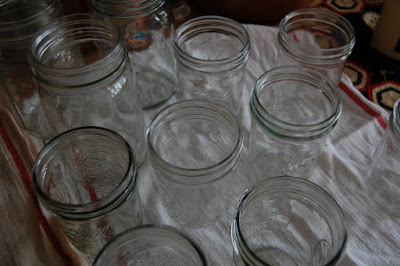 2. Making Christmas in my new hometown of Atlanta, segueing into how much delight I'm finding in this holiday season, the first one in several years that I have enjoyed for just-itself, or as I wrote a friend this week, the first holiday in years that I have not been a) destitute, b) traveling, c) on deadline, or d) having my annual nervous breakdown. Nah... too wide. I want to focus on the granola.
2. Making Christmas in my new hometown of Atlanta, segueing into how much delight I'm finding in this holiday season, the first one in several years that I have enjoyed for just-itself, or as I wrote a friend this week, the first holiday in years that I have not been a) destitute, b) traveling, c) on deadline, or d) having my annual nervous breakdown. Nah... too wide. I want to focus on the granola.
Let me strive for one clear moment in time. I'll take a lesson from what I teach. Take one moment, beginning-middle-end. Write short. Use telling detail. Use your senses. Your feelings. Show us that moment in lovely (terrible, excruciating, hilarious, comforting, angry, amazing) bas relief. Let us live it with you. So. Try again. Why is this moment important to me?
3. The first time I made this granola, I made it with my son, Zach. He was almost three. The recipe has the date written on it: December 1984. I took it from an old Rodale cookbook that was falling apart by the time I moved to Atlanta, so I cut the recipe out of the cookbook and pasted it into the front of American Wholefoods Cuisine by Nikki and David Goldbeck.
 But wait... I'm straying. I can add this in later if I want to, for texture and reference, when I revise.
But wait... I'm straying. I can add this in later if I want to, for texture and reference, when I revise.
I'm on to something. Let me grab my notebook. Scribble: making this granola with three-year-old Zach who is now almost 28. The way the day was so foggy and cold and damp, but inside the fire crackled and the young enthusiastic son stirred and tasted, stirred and tasted, standing on a chair at the table, wearing one of my aprons hiked up under his armpits, an enormous pot and a fat wooden spoon his companions, how he asked a million questions, how he wanted to gift the world with this granola, and how I learned he needed a funnel to fill the jars; how I wrote the recipe on homemade recipe cards, how he punched a hole in the corner of each, and how we, together, tied the recipe to the jar with a length of red yarn.
What else? How his eyes shined with his accomplishment. How we sang "Jingle Bells" as we worked. How he signed each card in green crayon with a crooked Z. How he said, like it was the most natural thing in the world to expect, "Let's do this again tomorrow." How flat-out happy I was... how young I was.
Yeah, let me write about that. Let's see: what happened first? I want a good lead. And what happened next? Let me capture this moment in time; let me preserve it forever.
3 Comments on early kitchen morning and memory, last added: 12/15/2009
The day I started school, walking into a kindergarten classroom in Honolulu, Hawaii, lo, these many years ago, September became the real start of my year. When I graduated high school in the Philippines, it was only a short time before I started getting children off to school in September. Now, over thirty years has past and that part of my life is done as well.
 But September is not done. Here it comes again, rolling over me with its tinge of fall in the Atlanta air, its slighty sweet sadness as the leaves begin to color and curl on the dogwoods in my front yard, and its abundance of late-summer crops from my local farmer.
But September is not done. Here it comes again, rolling over me with its tinge of fall in the Atlanta air, its slighty sweet sadness as the leaves begin to color and curl on the dogwoods in my front yard, and its abundance of late-summer crops from my local farmer.
I have more to say about September, but it will wait. Just as September is changing the air and the earth, I am changing inside as well. I'm not sure what it's about yet, so I don't want to say too much. I'm requiring a lot of alone time right now, lots of staring time, and very little movement, so I can listen well.
 The photos today are of Camp Springs Elementary School in Camp Springs, Maryland, just outside of Washington, D.C., and right next door to Andrews Air Force Base. My dad was stationed at Andrews in the sixties and was chief of safety for the 89th, the squadron that flies the president.
The photos today are of Camp Springs Elementary School in Camp Springs, Maryland, just outside of Washington, D.C., and right next door to Andrews Air Force Base. My dad was stationed at Andrews in the sixties and was chief of safety for the 89th, the squadron that flies the president.
I took these photos a year ago when I went back to Camp Springs to research. Today the school is a senior citizen center. Folks were happy to allow me to roam around, and I was happy to be back. Nothing is the same, of course, but inside my heart, it all came flooding back.
I came from Hawaii to Maryland the summer I finished second grade, and went to Camp Springs for the rest of my elementary school years. It's the setting for Fallout. It's the school Franny goes to. As her class is dismissed for recess -- it is fall 1962 -- Franny writes:
"The darkness of the hallway blinds me -- I am still surprised by the hallways with no windows and the closed-in way people go to school in Maryland. At Pearl Harbor Elementary School, the hallways had no walls. The classrooms had windows on both sides. Sunshine drenched everything. Camp Springs Elementary School feels like a cave." I remember that feeling in September 1962, walking through the front doors of Camp Springs Elementary School. I remember the gleaming floors and the way we had to walk on the right, single file, and the wall where we played a wall-version of four-square at recess and the sidewalks with that tough, sticky grass, the flagpole, the grates we hovered over in winter to keep warm during outdoor recess, the Glee Club, safety patrols, art, music, French! and more --
I remember that feeling in September 1962, walking through the front doors of Camp Springs Elementary School. I remember the gleaming floors and the way we had to walk on the right, single file, and the wall where we played a wall-version of four-square at recess and the sidewalks with that tough, sticky grass, the flagpole, the grates we hovered over in winter to keep warm during outdoor recess, the Glee Club, safety patrols, art, music, French! and more --
-- perhaps because I lived there so long -- seven years is a long time for an air force kid to live in one place -- or perhaps because I was ages 8 through 15... at any rate, these memories of place are so strong -- what it looked like, smelled like, felt like, sounded like, tasted like -- I remember it as if it were yesterday.
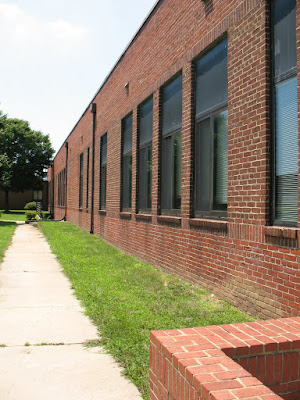 So... I wrote about that. All my books are in some way autobiographical, but this one is the most so. I held back nothing. I poured my ten-year-old self into this book -- a book of fiction, to be sure, but my story as well.. that inside story of what it felt like to be alive in the early sixties, living in that place, within that family and that community, a child of a military family during the Cuban Missile Crisis, a child who, like other children, wanted to belong.
So... I wrote about that. All my books are in some way autobiographical, but this one is the most so. I held back nothing. I poured my ten-year-old self into this book -- a book of fiction, to be sure, but my story as well.. that inside story of what it felt like to be alive in the early sixties, living in that place, within that family and that community, a child of a military family during the Cuban Missile Crisis, a child who, like other children, wanted to belong.
 It has been like my little secret, this town, this school, this family, this time period... this book. I've been nurturing it along since 1996. On some level it's surreal to see it beginning to take shape with a lush, full story, copy edited and almost ready for page proofs, with cover comps and inside art and other people's eyes upon it -- other people saying good things. If I think about it too long, it's overwhelming. Maybe that's part of why I need to be so still right now. Come May and publication, there will be no sitting still! And that will be fine -- I will be excited to support this book that is so much a part of me, that has been so lovingly co-created by so many folks in so many departments at Scholastic.
It has been like my little secret, this town, this school, this family, this time period... this book. I've been nurturing it along since 1996. On some level it's surreal to see it beginning to take shape with a lush, full story, copy edited and almost ready for page proofs, with cover comps and inside art and other people's eyes upon it -- other people saying good things. If I think about it too long, it's overwhelming. Maybe that's part of why I need to be so still right now. Come May and publication, there will be no sitting still! And that will be fine -- I will be excited to support this book that is so much a part of me, that has been so lovingly co-created by so many folks in so many departments at Scholastic.
Several of you have written me asking about my editor meeting: it was good, thanks for asking. Very good. We have been inventing a new language for these three books about the sixties -- books that include newspaper clippings, song lyrics, recipes, photographs, and more.
 So far, we've been using the terms "scrapbook," "interstitial" and "distillation" to refer to various elements of the book. On Sunday we came up with another new term: "documentary novel."
So far, we've been using the terms "scrapbook," "interstitial" and "distillation" to refer to various elements of the book. On Sunday we came up with another new term: "documentary novel."
It seems I've written a documentary novel. Who knew? My editor has been using the term for some time now to describe the novels in the sixties trilogy, and I'm going to try it on for size as well.
I'm not sure what I think about it yet. I'll let you know. But I do have a question: what does that conjure up for you? Documentary novel. Just wonderin'.
I'm going back to my staring now. The work ahead is on my mind. I've got a draft of the 1966 novel, but it needs so much work. And Scholastic would love to have it in February. Maybe that's another reason I need to sit and stare. February! It's just around the corner, really.
I'm re-entering the time of September, when traditionally I sit down at my desk and begin the work ahead with fresh pencils, a rested mind, and the optimism of a new year. That's worth contemplating.
Home, friends. I am home. There's no place like it, and I'm glad to be here. Thanks for coming to the low country with me. I had no words last week, but I loved reading yours. Thanks for all the lovely mail. I savored every word.
 And now... a return to our regularly scheduled program. I have breakfast with my editor this morning (Sunday). He's here for the Decatur Book Festival, so we will take some time to be together this morning, to meet face-to-face for the first time, and start getting to know one another in person.
And now... a return to our regularly scheduled program. I have breakfast with my editor this morning (Sunday). He's here for the Decatur Book Festival, so we will take some time to be together this morning, to meet face-to-face for the first time, and start getting to know one another in person.
If you've been reading One Pomegranate, you'll know that I lost my long time, beloved editor, Liz Van Doren, in early 2007 -- a devastating blow. We had worked together for 12 years. Over time, we had learned to complete each other's sentences as we talked about stories. We challenged each other. We made good books together.
Kate Harrison became my editor at that time. Within the year, she left Harcourt for Dial/Penguin, and I landed at Scholastic with Kara La Reau and David Levithan. The plan was that I would work on the first of the sixties trilogy with Kara, but eight months later, Kara was laid off, just as I was nearing the home stretch of a complete draft of book one.
David and I began working together less than a year ago. In that time I finished the draft, finished another, and another, and have gotten to know David through phone calls and email. He's a good editor. I don't know him well yet; we are learning to work with each other, and I understand that good working relationships take time and trust. It's not necessary for us to become friends, although that would be nice, but we are already colleagues in book making, and I am delighted by that.
At any rate, it will be good to have met face-to-face as we come into the home stretch of putting this novel to bed. There are a million things to talk about, to ask about, to learn. And to share. Many of them have nothing to do with books. I'm looking forward to breakfast. It's good to be home.
As for Charleston: we'll be back. It was good. Very good. And... I have a prompt for you (and your students):
Take a digital camera with you and take photos on a given day of objects that tug at your heart. Don't think too hard about why they tug, just trust your gut. Take as many photos as you want.
Then, take a look at your photos and select the four or five that can tell a story of that day in one word. That one word will be a theme, if you will. Let that one word title and those photos help you tell a story wordlessly. Let them evoke a memory, an emotion, a mood, a narrative. See what you come up with. You can use my posts from last week as a model or guide. This should be creative and fun -- and full of good ways to think about story.
I'd love to see what you come up with. It could be a notebook exercise. The photos, printed on computer or photo-quality paper, could be pasted into your notebook with your one word as a heading. (Conversely, if you are keeping a blog as scrapbook (One Pom is part scrapbook), you can easily construct this as a blog entry.)
So. Personal narrative in photos. I'd love to hear the discussion this engenders, too, and the ways that you adapt it for your own purposes.
And now: What to wear to brunch? It always comes down to the practical considerations, doesn't it?
It's not so much about blackberries as it is about memories. Personal narrative. And how I believe we live through our personal narratives, often molding and shaping them as we grow older, seeing them through a softer lens or a sharper one, depending on who we are and how our eyes adjust, how our hearts grow... or don't.
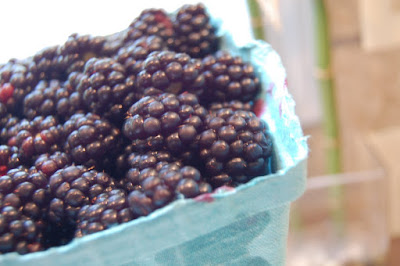 I'm feeling sad today. It's a free-floating kind of wistfulness, and it's fine -- some days are like that. I'm remembering my former mother-in-law's tomato relish because a batch of it is bubbling on the stove right now. I haven't made it in at least ten years, but today the house is full of that familiar vinegar, sugar, black pepper, tomato smell, and I am sifting back in time.
I'm feeling sad today. It's a free-floating kind of wistfulness, and it's fine -- some days are like that. I'm remembering my former mother-in-law's tomato relish because a batch of it is bubbling on the stove right now. I haven't made it in at least ten years, but today the house is full of that familiar vinegar, sugar, black pepper, tomato smell, and I am sifting back in time.
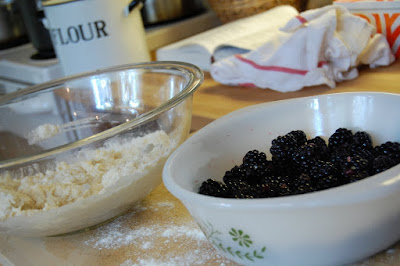 I'm remembering the things we define ourselves by. For instance, this mother-in-law -- her name was Juanita -- was ten years older than my own mother, Marie, and twenty years older than my first mother-in-law, Carolyn. I married as a teenager, and Carolyn had been a teenage mother as well. I was only nineteen years older than my first-born child. Whew. So I had a mother-in-law who was 35 years old when I married at 18. We were both so young.
I'm remembering the things we define ourselves by. For instance, this mother-in-law -- her name was Juanita -- was ten years older than my own mother, Marie, and twenty years older than my first mother-in-law, Carolyn. I married as a teenager, and Carolyn had been a teenage mother as well. I was only nineteen years older than my first-born child. Whew. So I had a mother-in-law who was 35 years old when I married at 18. We were both so young.
I knew these numbers so well... they were a part of me. As we all got older, I continued to add it up. And then, Juanita died at age 83 (which meant my mother would have been 73), and my mother died at age 78, and it's harder to keep track of numbers now, especially now that I have a new mother-in-law who has just turned 83. My mother today would be 84. This week.
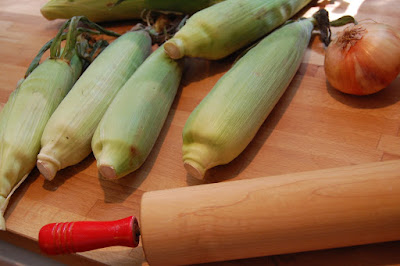 Before I started the tomato concoction to boil and reduce to a thick ketchup, I took the blackberries I bought at the farm earlier this week, and sprinkled them with sugar. I opened the Joy of Cooking I had given myself as a present in 1978, when I was 24 years old, newly married a second time and learning how to cook, and I decided to make a cobbler. I took my mother's rolling pin out of the drawer and felt its heft in my hand, remembered the times I had sat at the counter while she rolled out the jingle bell cookies or the pie dough at Christmas, and remembered her saying, "Some day you'll do this with your children." And I did.
Before I started the tomato concoction to boil and reduce to a thick ketchup, I took the blackberries I bought at the farm earlier this week, and sprinkled them with sugar. I opened the Joy of Cooking I had given myself as a present in 1978, when I was 24 years old, newly married a second time and learning how to cook, and I decided to make a cobbler. I took my mother's rolling pin out of the drawer and felt its heft in my hand, remembered the times I had sat at the counter while she rolled out the jingle bell cookies or the pie dough at Christmas, and remembered her saying, "Some day you'll do this with your children." And I did.
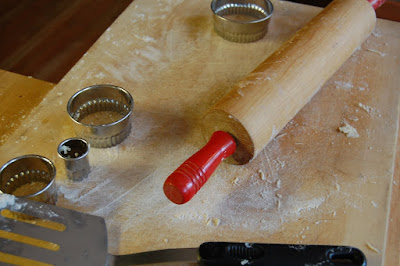 I made the rolled biscuits on page 632 of Joy, and followed the directions for cobblers on page 660, but I didn't heat my fruit or add flour or egg to thicken it -- I knew the biscuits would do their part to soak up the juice. My mother had taught me this.
I made the rolled biscuits on page 632 of Joy, and followed the directions for cobblers on page 660, but I didn't heat my fruit or add flour or egg to thicken it -- I knew the biscuits would do their part to soak up the juice. My mother had taught me this.
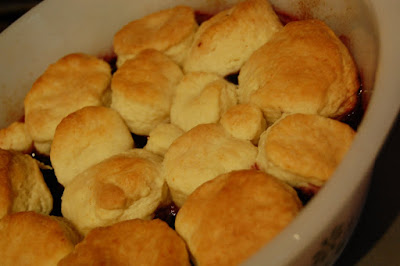 I thought about those blackberries. There was a huge field of wild blackberries next to Camp Springs Elementary School in Prince George's County, Maryland when I was growing up. I wanted in the worst way to pick those berries. An old ramshackle house was in front of the field. At recess, we'd sometimes stare at that old house and wonder if anyone lived in it. Certain kids -- you know who they are -- would boast that they had seen an old lady with wild white hair and a pitchfork on the porch. Others said that ghosts haunted the house.
I thought about those blackberries. There was a huge field of wild blackberries next to Camp Springs Elementary School in Prince George's County, Maryland when I was growing up. I wanted in the worst way to pick those berries. An old ramshackle house was in front of the field. At recess, we'd sometimes stare at that old house and wonder if anyone lived in it. Certain kids -- you know who they are -- would boast that they had seen an old lady with wild white hair and a pitchfork on the porch. Others said that ghosts haunted the house.
One day after school, I braved the blackberry patch, all alone. My heart beat wildly in my chest as I kept an eye on the back of the house while I bent down to see those berries. The smell was overpoweringly heady -- a blackberry feast of the senses that I remember to this day. This smell filled my kitchen as my cobbler baked and I washed the dishes.
 There were too many thorns for me to pick long, but I didn't need many. I had emptied my pencil case into my satchel, and I filled it with blackberries -- for my mother. She would be so surprised! I raced home, skipped in the door, ran up the stairs to the kitchen, and announced my treasure.
There were too many thorns for me to pick long, but I didn't need many. I had emptied my pencil case into my satchel, and I filled it with blackberries -- for my mother. She would be so surprised! I raced home, skipped in the door, ran up the stairs to the kitchen, and announced my treasure.
"Were you trespassing?" was the first thing my mother asked me. Well... yes... I was.
"Only at the very back of the lot," I said, which was true.
And you know... I don't remember the rest of the story. I could make it up -- I could write some creative non-fiction, or I could write pure fiction about that day. I could say we sat down to blackberries a la mode and a meaty conversation.
I'm sure we didn't. I would remember that, wouldn't I? Memory is so complex, so unreliable, so slippery. And I didn't know anything about picking blackberries. What I had picked was mostly under-ripe -- not the luscious black of the berries I pulled out of my oven and piled into my bowl.
 From that day on, I never really cared for blackberries. Not that I had had a hankering for them before. Likely I just wanted to do that forbidden thing, to see that forbidden fruit, and to offer some to my mother. It was all about wanting to be loved, as it always is with us human beings... wanting to give love and be folded up into love.
From that day on, I never really cared for blackberries. Not that I had had a hankering for them before. Likely I just wanted to do that forbidden thing, to see that forbidden fruit, and to offer some to my mother. It was all about wanting to be loved, as it always is with us human beings... wanting to give love and be folded up into love.
So I made a blackberry cobbler this week, surrounded it with homemade peach ice cream, broke my biscuits into the sweet hot blackberry juice, and took a bite of my memories. I held my spoon heavenward, in a toast. "This is for you, Mom."
Pictured below is yesterday's haul at Book Nook in Decatur, Georgia. I almost never find anything affordable anymore at used book stores. Long gone are the days I rummaged through boxes of books on the side porch of a little thrift store in Vienna, Virginia and bought books there for a nickel a piece when I could afford the extra nickels.
I also bought my then-three-year-old daughter a nightgown for 45 cents, which stays in my mind for some reason -- even the very look of it I remember... it was soft, well-worn cotton, buttercream yellow with tiny lace trim on the sides and bottom. Oh, how A. wanted that nightgown.
It was 90 cents, and outside my very paltry budget that day, but the owner took one look at us, and especially at A., who had her hands clasped under her chin, longing for that nightgown, and said, "Today, it's half off." My daughter wore out that nightgown before she grew out of it.
I digress.
 I am partial to thrifting. Years ago, it saved my life. Even though that sounds like a drastic statement, it's true, and one day I will write about that life. These days, thrifting sports a different hue, but is no less important to me. Most of my home is furnished with thrifted items, and most of the clothes I wear are thrifted.
I am partial to thrifting. Years ago, it saved my life. Even though that sounds like a drastic statement, it's true, and one day I will write about that life. These days, thrifting sports a different hue, but is no less important to me. Most of my home is furnished with thrifted items, and most of the clothes I wear are thrifted.
(Another aside: I once worked in an IRA symposium with the wonderful Naomi Shahib Nye, who boasted at the microphone (because she'd been introduced this way) that she had not bought anything to wear in over 8 years. "Share with your friends!" she said. Say it, Sister!)
Ahem. To the books. I love old cookbooks and gardening books, and old, odd books about keeping house and parenting. Yesterday at Book Nook, I found so many good ones on the half-price bookcases. The entire haul cost me $11.77, with tax, which is harking back to those good old days before thrift stores really knew how much old books could bring.
Maybe these books are important only to me. That's fine. This winter I will savor The Encyclopedia of Cooking (1951), Farm Journal's Cooking for Company, The Winter Garden, and sooner than winter I will try some recipes from Our Daily Bread along with the Chocolate-Orange Meringue Pie ("Light and colorful with grated chocolate as a garnish and a surprise layer of chocolate under the orange custard filling" p. 228) from Farm Journal's Best-Ever Pies.
Wanna come for dessert? A recipe isn't complete until it's shared.
I'm thinking about cooking lately since I have time to cook these days (have made time), and because I see what a community cooking and eating together creates.
Michael Pollan was interviewed on Fresh Air yesterday. It's a 20-min. interview worth listening to. He'll have an article in the Sunday New York Times worth reading about the same topic -- we watch cooking shows, but we cook less than ever. Why is that? He posits that it may well be that it wasn't fire or even language that grew us up into human beings. It may be the act of cooking.
And thrifting. :> Finding new uses for old discards. Or repurposing what we already have. Kids do this instinctively -- the couch cushions turn into a rocket ship or a cave.
What about you? What do you thrift or repurpose, and how do you do it, and why? What's the greatest, neatest, coolest, funkiest, funniest or most amazing thing you ever scored/thrifted/yard saled/repurposed?
Write about that. Short. One seed of the pomegranate. Just one story. Beginning, middle, end. Take a snapshot, draw a picture, give it some heart, make it a song. I'd love to see it, hear it, savor it. It will enrich my life every bit as much as that Chocolate-Orange Meringue Pie. Less calories, too.
It's why we're here, to share our stories with one another.
The ingrate. Just look at him, belly on the cool wood floor, little right foot sticking out so coyly. We rescued him from the bushes two years ago, when he was just a few weeks old, nurtured him to health, spent a bazillion dollars in vet bills -- he was always getting torn up outside by some thing or some other cat. We cooed to him and coaxed him and played with him and educated him and lovingly encouraged him to love us right back even as he chewed on our fingers and nipped at our ears -- hahahahaha. Our mistake.
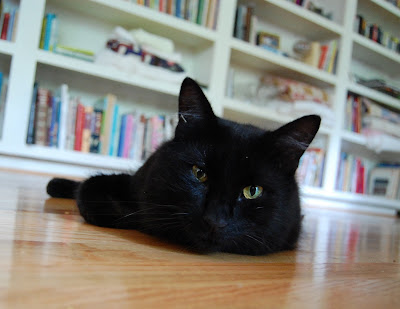 Here is Cleebo, named for the same character in The Aurora County All-Stars. Cleebo the Clueless, I called that character. But this Cleebo is not clueless -- he's wily and crazy like a fox.
Here is Cleebo, named for the same character in The Aurora County All-Stars. Cleebo the Clueless, I called that character. But this Cleebo is not clueless -- he's wily and crazy like a fox.
He stays away for months at a time. Yes, months. He returned at Christmas after an absence of a month, and we rejoiced. He sauntered in, chowed down, and waltzed right back out the door. He was gone for over two months this spring -- we were sure the coyotes that live across the way had gotten him. But here he came on the Fourth of July, still wearing his collar and name tag (with our phone number on it), loping down the driveway like he'd never been gone a day, right past me as I stood in the garden and watched him, my hands full of weeds.
We were overjoyed to see him the first time he came back. We had been so worried about him and had missed him so much. Now, when he shows up again, we hardly move. Someone says, still lovingly (we are suckers for Cleebo, we can't help it), "you ingrate..." as he sashays past us heading for the food bowl. Then I make sure he has his flea meds and is up to date on his shots before he can get back out the door.
He has been in and out since July 4, and I don't know if he intends to stay for a while or not. I've thought about writing about this cat, making up a story for a picture book, but I don't have a strong attachment to that idea, and I need that strong pull to the heart before I can make any story successful, so I'll pass on using Cleebo as a story idea.
So I won't write about Cleebo, and I don't write about my children or grandchildren or even the present day. I tend to plumb my young life for stories instead. I always go where my heart leads me, in trying to tell a story. The craft can and must come later. But if my heart's not in it, if there's not something strongly and steadily pulling me toward writing a story whether or not it ever becomes a book, then I leave it alone -- it's someone else's story to tell.
I've got four or five stories clamoring for my attention right now. I've got to turn my full attention to book two in the sixties trilogy soon, but I think I can work up one of these shorter pieces now. Which one is yakking the loudest? Time to sit down with my notebook and see.
 Oh, Seattle! How I adore you.
Oh, Seattle! How I adore you.
I adore you so much, I'm still hoarse. I talked and ate, ate and talked, and laughed and learned so much from you last week... and I have spent most of my weekend in BED, recovering. Believe me... you were worth it.
Now to make sure that I can talk the rest of the week, as I visit south Georgia schools on Tues. and Wed., and speak at TASL -- Tennessee Association of School Librarians -- on Saturday. I must have a voice!
Who has the wonder cure for hoarse throats? (I can't even say the dreaded L word -- laryngitis.)
I am drinking hot Yogi Tea with honey, I am gargling with hot salt water, I am sucking on Ricola drops, I am speaking only in a whisper... and my voice is a bit better today, but not yet in singing form (which I need for K). I've got about fifteen hours left before I need to use this throat again.
But back to Seattle, the new love of my life:
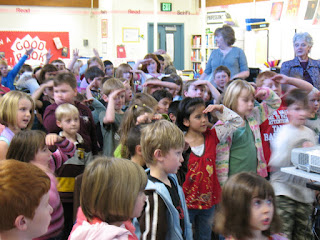
Thank you, you beautiful students, resourceful teachers, and intrepid team at Glenridge, led by Tina and Mimi, and same-o to the good folks at Grass Lake, who so graciously sat through a two-hour teacher workshop after school, and who offered up their stories.
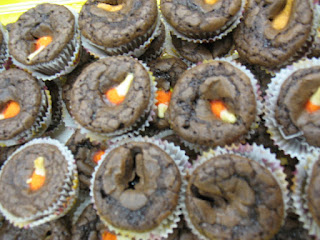
Thank you, Mary Jo Lambert, for putting together such a meaningful day at Grass Lake, and thank you to friends Nancy Johnson and Kathryn Noe for coming from their respective schools in Bellingham and Seattle, to take a tired author to dinner before her red-eye flight home.
So much happened in a week. I started in Atlanta, flew to Boston for Nancy Werlin's wedding (so lovely), flew to Seattle to visit family, then to work in schools, to visit with friends, and then flew home through Minneapolis, to Boston, then back to Atlanta, where I crash landed in bed. And all the while... we ate.
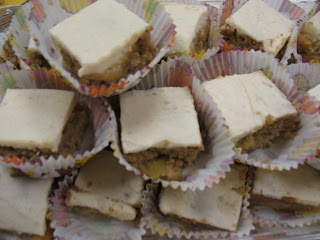
Food, glorious food.
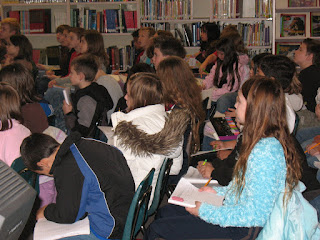
Students, glorious students.
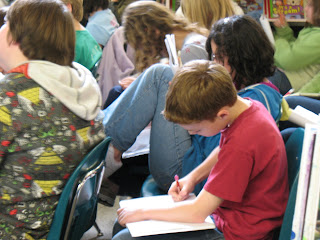
Notebooks, glorious notebooks.
And more food.... I am working up to a post about how all the wonderful food on the road conspires to elephantize authors, but I'm not ready for that one yet... still. STILL! It's so hard to resist, and so much fun to partake, and the community is luscious, it is.
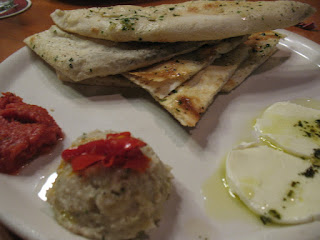
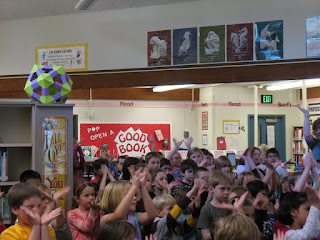
Here are K's (some first graders, too) dancing to ONE WIDE SKY...
Did I mention food? Thank you, Allison, for your baking wizardry, AND for the recipes.

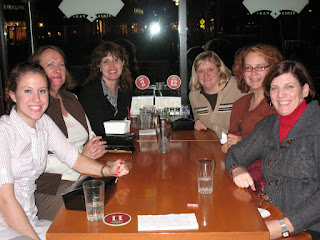
Glenridge teachers. Baker Allison (or is it Alison?) is in the back, left. Artist Debbie (who did the Ruby/Welcome artwork at the top of this post) is in back, right.
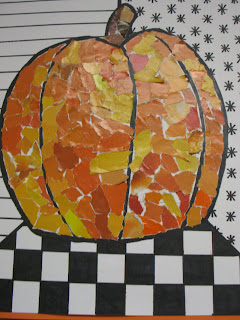
It was fall in Seattle, and yes, we had rain. We also had sunshine. And pumpkins.
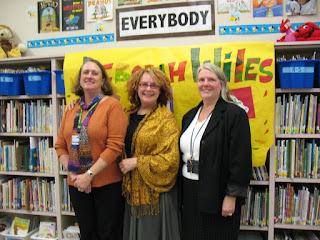
A big thank you to Mary Jo (right) and Mimi (left) for working so beautifully with their teams and making these visits so special.
I am ready to come back! Anytime.
Just let me find my voice....
 Back to work in a real way this morning. Last night I had several breakthroughs while on my walk (exercise is part of process!), which catapulted me out of bed this morning, eager to get to work.
Back to work in a real way this morning. Last night I had several breakthroughs while on my walk (exercise is part of process!), which catapulted me out of bed this morning, eager to get to work.
Breakfast on the porch this morning while I contemplate my progress so far this month. It never fails to amaze me how the slog slog slog of days turns into a white-heat for me. I know it's different strokes for different folks. Some writers must write every day. Some go for weeks without writing a word, while soaking up whatever it is for the next story, or coaxing it to the surface.
I am more in the latter camp. Unless I am on deadline, I go for days without writing the actual story at my laptop, but I don't let a day go by without scribbling in my notebook. Of course, right now, during this white-heat, deadline time, I am writing/revising the story, at my laptop, every day.
I use my notebook daily -- even if it's for a to-do list or a grocery list and that's it -- even when I'm traveling (esp. when I'm traveling -- I write on airplanes this way, in the interminable waits on takeoffs and landings, and then I transcribe to my laptop). The physical act of writing in my notebook keeps my writing pump primed.
Here is some of what I have scribbled in my notebook about the novel in the past three days. I haven't corrected spelling or grammar, as this is stream of consciousness, and also quick-recording. Here it is, just as I wrote it.
You can see, there is lots of personal narrative in here -- I am taking my life -- my ten-year-old life -- and turning it into story, a totally made-up story.
----------------------------------
Word assoc. with CMC what?
Fear
Invisible
Drill
Tie the explorers and fifth-grade exploration unit, note taking, etc., into the narrative.
Note-taking some of the letters, memos? Franny writes like that?
Explorers discovering new lands, vs lands about to be annihilated with atomic war.
MAKERS OF THE AMERICAS has balboa and also cuba in it. Copyright 1947
What about textbooks having incorrect information? Howard Zinn, the people’s history of the united states, etc.
A kid will move in across the street who brings Franny down a notch and teaches her that she is special without being special. Deflates her ego but shows her the truth. No.
JoEllen is a mentor. Magician, whatever.
LOSING BATTLES, no exposition. Can I do this?
Absolutely true diary remember that novel. What I am writing is highly autobiographical.Just found out Franny is the new kid.
My weekly reader, current events
Guns of navarrone
War of the worlds
Franny will be 11 and in fifth grade, and it will be 1962. I’ll start in Sept.
Was trying to make her 12 in 1962 and in sixth grade, but it’s not going to happen, this feels better.
Oct. 9 2008
On my trip to kudzu
HALLOWEEEEEN! Was talking with meg at kudzu this afternoon about Halloween and our childhoods and I told stories about my children’s childhood and the fire at the end of the driveway and everything… what about Franny and Halloweeen might be impt. I have had this thought before but abandoned it. Now it feels just right.
On my walk tonight:
GALE is not a bad girl, although Franny’s mother thinks she is… and Franny will find this out… hmmm… defy her mother? Gravel pit? What? So maybe franny and Margie don’t break up, but they have a tough time of it over gale and Margie growing up faster, gale already grown up a lot
Halloween: noisemakers from the fifties/early sixties, costumes, card table and old woman (work this in somehow with fear)Halloween party at school?
Maybe gale’s mother DIDN’T allow her out on beggars night, maybe Gale’s mother works nights and Gale just went out on her own. Gale can be racy but not bad… risky but not ridiculously so. Maybe her mother is separated or divorced… a no-noin the early sixties.
Mom, can I sleep with you tonight? Dad’s out of town on a trip. Mom will pick him up at Friendship and JoEllen will babysit. What about uncle otts?
Franny’s mother, Nadine, is Miss Mattie’s daughter. So she is Evelyn Lavender’s sister and Ruby’s aunt. That makes Franny and Ruby cousins. Ha!
Drew wants to sleep with mom, too, but it’s franny’s turn. Does she hear him sniveling in bed and how does she feel about that? Does she go into his room and comfort him? Sleep with him in a twin bed? Army men are everywhere? They can still fight later.Oh, I should use those caterpillars! And locking drew out of the house/shed thingie! Can be little flashbacks… to first snow, and etc. the way I did Uncle Edisto and Aunt Florentine flashbacks. This
can be a good story.
Oct 10
New kid moves in across the street woody with raccoon goads drew? Gravel pit? Now drew has a friend his age in the neighborhood?
Is gale jewish? Does she not show up for school for rosh Hashanah and yom kippur?
------------------------------------
Finish notebook entry.
This is my process now. The story is revealing itself to me, bit by leap. I am scooping it up. My notebook goes with me everywhere, to record what is being revealed, to ask questions, to practice what-if, to capture tiny fragments as they present themselves.
And yes, this far into this novel (years worth!), I am still uncovering layers of meaning and structure. This is the way it is with every novel, for me. I've come to believe that I push a novel at my peril. In some ways, I don't believe I
can push it to reveal to me its secrets. I just have to keep showing up at the page, whether it's the laptop or the notebook, the slog or the white-heat. (I like white-heats a lot better.... insert hollow laughter here.)
Nothing is too small to note. Nothing that doesn't work out is wasted. It is all necessary to the whole and to the finished project. This is why I tell my students, keep a notebook. Put everything in it. Everything. You never know when you may need it. Paste leaves in it and photographs. Clips recipes to it and letters. Draw pictures, scribble, pour your heart out, and you will see:
There it is, on the page: your voice.
We interrupt this program to catch up on the mail.
Yes, I do teach personal narrative writing, and yes I am so, so behind on answering requests for information about that, which always seem to come hot-and-heavy in August and September, as schools are looking at their coming school year's calendar (likewise in May and June).
I'd like to offer some thoughts here, in an effort to gather the teaching information into one document, and then I'll go back to catching up on the mail one letter at a time. I had a computer crash earlier this spring and lost some mail -- I'm still trying to reconstruct from that as well, and I don't mind a reminder from you if it's been too long since you've written and you're expecting a response. I've got an unpublished page on my website that details my teaching work, and if you want more information after reading this, shoot me an email.
I've been teaching writing for over 20 years. I've seen so many rubrics, guides, assessments, techniques and tools come and go, and I've tried my hand at teaching all genres, but I was a freelancer first and the essay is my first love -- here is an essay I wrote for Hallmark Magazine in February '08 -- it's an example of what I'm about to talk about -- writing personal narrative, writing short, writing from the three places that story comes from: the head (what you know and remember), the heart (what you feel) and the gut (what you can imagine). (Hmmm... the link at Hallmark appears to be broken -- here's my blog entry about that one clear moment.)
I teach only personal narrative writing, as it's what I know best, it's where I started, it's what schools are mandated to teach, it's the kind of writing that -- when understood -- brings much personal satisfaction and a vital sense of accomplishment. Personal narrative gives us a storyline. It helps us see how we belong, how we are -- or aren't -- safe in the world, and how we love, how we fear, how we want to change, too... personal narrative reveals our hearts and gives us all we need to know to understand ourselves and one another. I always say, it's hard to make someone your enemy when you have shared your stories honestly with one another.
I often use poetic forms when teaching personal narrative, but we always end up with a narrative, a story, beginning-middle-end, short, one clear moment in time, that comes out of life experience. Kindergarteners can do this. So can you.
I teach teachers, in day-long or after-school workshops, I teach at conferences, and I teach always on-site, never through the mail or email (although I love to see finished narratives arrive in my mailbox). In schools I target grades 3 and up, and particularly grades 3-6. I have taught high school writing and college-level writing, but my sweet spot is upper elementary school.
Your students become my students for a day or for up to one week. I assign homework. I teach each grade, and each class, differently. I work closely with the classroom teachers -- we are partners -- and the school administrators to achieve your goals... we work out beforehand what those goals are, and we go from there, tweaking as we go. We work hard, and we have fun. There's lots of laughter, and sometimes there are tears, especially when someone taps into a meaningful vein, and others are there to listen to that story, to support that writer, to support the writing community we are creating.
Here are some photos (and a narrative!) from a day spent at Mantua Elementary School in Fairfax, Virginia last year, working with the entire fourth grade, teachers and students, in a two-day personal narrative residency. I'll be back at Mantua in January, to work with the third grade students and teachers -- I'm so looking forward to it.
Last month, I worked with the lower-school teachers at Heritage School in Newnan, Georgia, and last August at Wayne Avenue School in Dunn, North Carolina, with the fourth- and fifth-grade teachers (Hey, Karen!). A look at my calendar page on my website will give you an idea of the different residencies and workshops I've done over the years. These days, even an author visit to a school is conducted as a writing day; it's instructional time, even in an assembly program. Sometimes there are unexpected results. :>
I am well-versed in the tenets of six-traits, four blocks, umpteen other assessments, theories, rubrics I've worked with. When I teach I pull from them, as well as from some of my teaching heroes, such as Lucy Calkins, Donald Graves, Katie Wood Ray, Georgia Heard, Ralph Fletcher, Shelley Harwayne, Nancie Atwell, Nancy Johnson and Cyndi Giorgis, and many, many more whose books adorn my office bookshelves and have been lovingly and enthusiastically absorbed.
But my most important teachers have been the writers who write personal narratives so well: E.B. White, Patricia Leimbach, Anna Quindlen, Erma Bombeck (yes), Jean Shepherd, John Gould, Noel Perrin, Donald McCaig, Annie Dillard, Gladys Taber, Doris Kearns Goodwin, Joan Didion, Phyllis Theroux -- I know I'm leaving out some of my favorites. There is a reason I had Jim Williams build me so many bookcases in this house. I need them! I have collected my heroes for so long, and have spent so many years, in the trenches, pulling apart their work.
For me, this learning to read like a writer has been just as valuable -- more so, dare I say -- than any how-to book on writing (although BIRD BY BIRD comes close). I think we need both, and that's how I teach; some modeling, some instruction, and always the questions: What makes writing good? -- Let's put together our own list. And look at this author -- listen to that voice! How does she do that? How can you do that, too?
This is an organic way of learning -- absorbing what is going on in a text, what it says to you as a reader, AND as a writer. "How does he DO that?" is the quest I was on as I learned to write... I am still learning, always learning, and "how does she do that" is my holy grail. And, this search for the answers and integrating them enthusiastically into my writing, then leaving the models behind and charting my own unique path... this is the way I teach.
Oh, I do keep in mind those traits and blocks and more -- I know them by heart. And they are all taught intuitively when you love the work you are doing and have torn apart text after text, have been trained to listen for voice, to notice word choice, to appreciate sentence rhythm and fluency, to analyze structure, and to pass on these skills daily, throughout the day, to your students... it becomes second nature.
It amazes me that we place so much emphasis on testing and writing in schools, and yet, in undergraduate teacher education, we so rarely teach the art of "how to teach writing" to prospective teachers. And yet, we hold these teachers accountable for so much. They step into the classroom inheriting so much that is beyond their purview. And they must step up the plate, and teach each child how to write.
Writing is hard. Good writing is especially hard. Consistently good writing requires consistent practice, consistent attention, consistent love (sort of like learning how to love a new puppy) which brings with it a passion for stories, and we all have stories. We ARE stories, waiting to be found, and we are our own best documentarians. Ideas are everywhere. They are the air we breathe.
All the how-to books in the world cannot compensate for daily reading and writing, and daily examination of how a writer accomplishes her task of producing that finished piece from the rough first draft of her imagination. And that process is best taught using models of "what makes writing good."
In the classroom I read and read and read, and ask question after question -- and model for my students what I want them to do. I have them write short -- you can teach every convention of good writing by writing short. Revision is easier to comprehend if you write short, one clear moment in time.
Try, I say. It's hard, but it's so rewarding. Risk. Let's see how such-and-so does it. YOU have a story to tell as well, many stories... what are they? Get out your notebooks. Let's get to work.





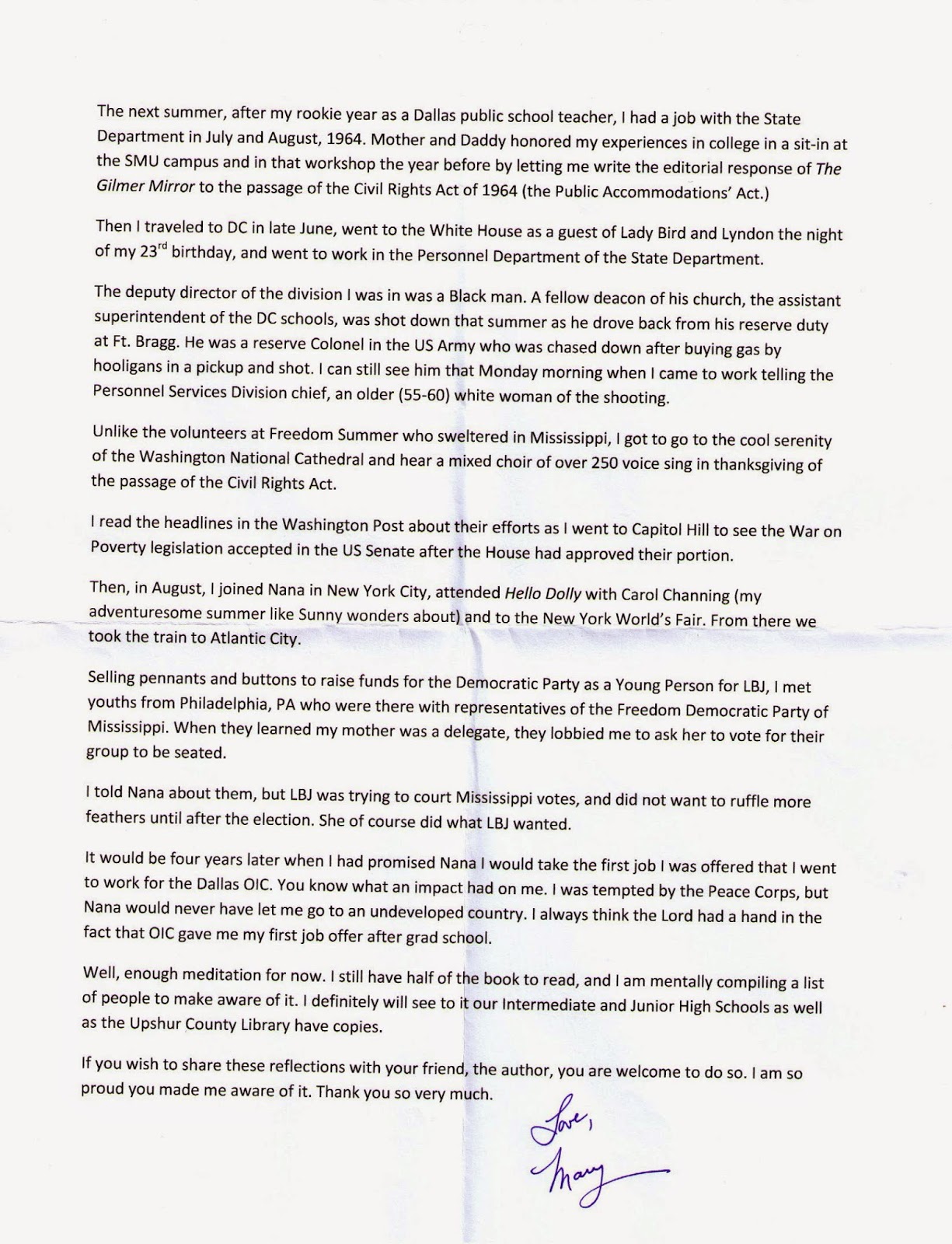
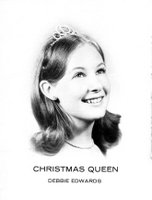
I cannot wait for the book. I am a HUMUNGOUS FAN!!! I love ALL your books, but specifically I read Rubies book yearly. Thank you for your beautiful God, given,talent. You make me laugh, cry, and long for a better way of life. When I first bought your book "love Ruby lavender" I got it for my daughter who was 10 at the time. I read it first, I LOVED IT!!! I have been reading it every